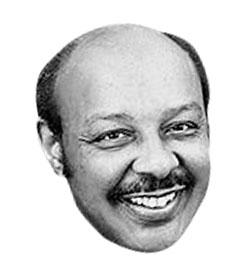
The NYPD’s stop-and-frisk policy has inspired a lot of anger and bad press (and now one Father’s Day march), but never the censure of a judge. And the reason it’s legally okay to check the person of anyone looking sufficiently suspicious—despite no outward criminal behavior—traces back to a crusade that a lawyer named Louis Stokes lost in 1968.
The Terry in Terry v. Ohio, as the case was known, was John Terry, a member of a prominent African-American family in Cleveland who’d returned from Vietnam with a drug habit. Terry was busted on Halloween afternoon in 1963 by Martin McFadden, a 39-year veteran of the Cleveland police. McFadden had spotted Terry and two other men hanging out near Zucker’s, a downtown haberdashery. He approached and frisked them and found guns.
Stokes, chairman of the legal-redress committee of the Cleveland NAACP, believed the arrest was dubious. Representing Terry in court, Stokes pressed McFadden on the stand, where he got him to admit that the men weren’t doing anything other than peering into store windows, and that he’d never busted anyone before for seeming to case a business. “What attracted you to them?” Stokes asked. “Well, to tell the truth,” McFadden answered, “I didn’t like them.”
McFadden’s “I didn’t like them” provided the basis for Stokes’s appeal, which argued that the officer had performed an “unreasonable search” forbidden by the Fourth Amendment. “McFadden said he suspected [they might commit a crime],” says Stokes. “Until that suspicion has ripened into something, you don’t have the right to subject them to frisks on the street.” Stokes, now 87 and still practicing law, had an emotional attachment to Terry’s cause. He’d been stopped by the cops himself, the first time when he was 12 years old. “I was on my way to a Boy Scout meeting one night when two white detectives jumped out of a car and searched me on the street.” He took the issue to the high court.
The case hinged on whether, after Terry displayed suspicious conduct, McFadden had license to pursue and search the men—not to see what he would find but instead for his own well-being. In the end, the justices ruled that McFadden’s safety and that of those in the vicinity outweighed the “indignity” that Terry might have suffered. Soon after, Stokes was elected to Congress. He held a seat for 30 years; there’s a VA hospital named for him in Cleveland, which also has a Louis Stokes Museum. And “Terry frisks,” as they’re sometimes called, are taught at every police academy. “If you were to stand in Times Square and ask almost any black male if they’ve been stopped by the police and then told to ‘Just get on down the street,’ ” Stokes says, “out of ten, I’d bet you’d get nine.”
Have good intel? Send tips to intel@nymag.com.